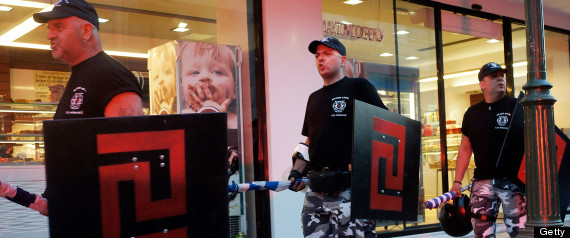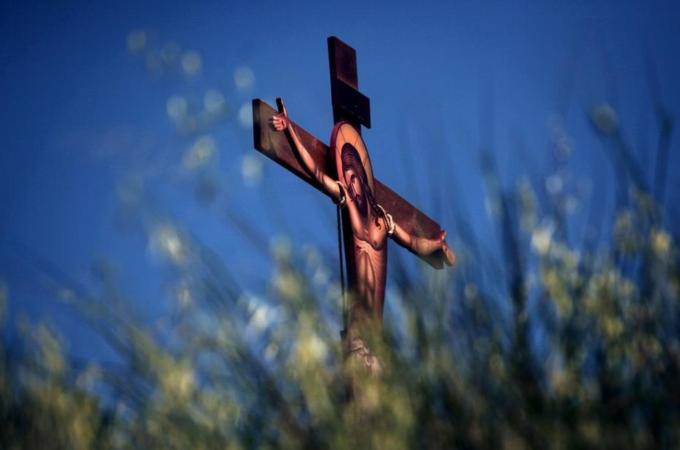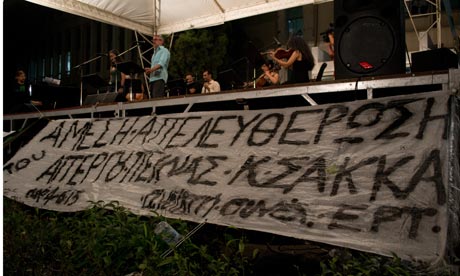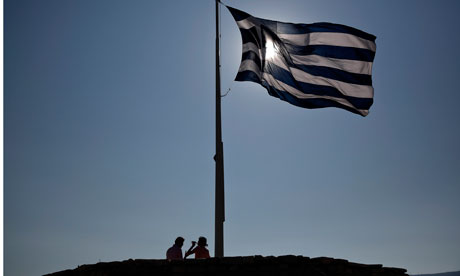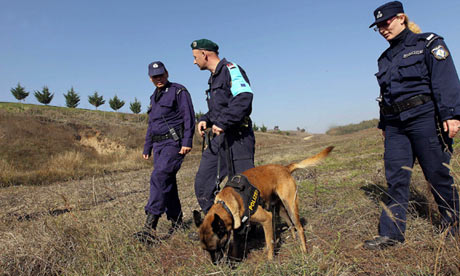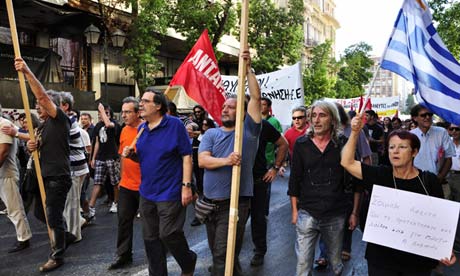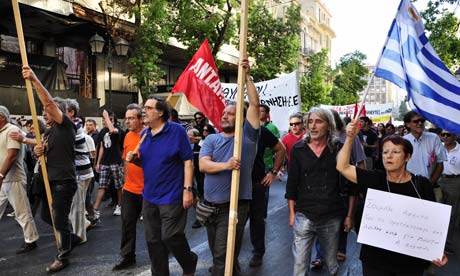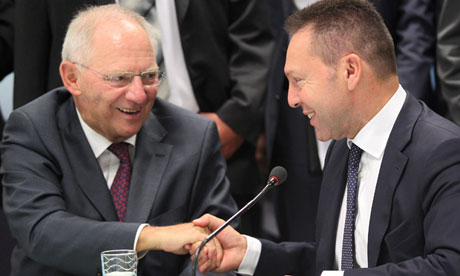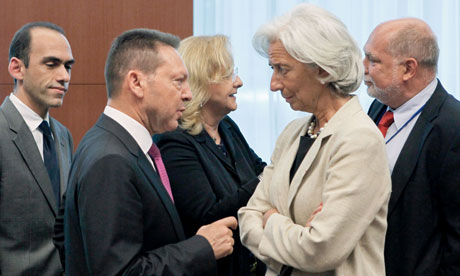By Ross Cameron
Photo: We must admit that European currency union was a dumb decision, fuelled by the misty-eyed vanity of the Left. (AFP: Frank Rumpenhorst)
The euro is a straight jacket, with Europe's productive north forced to pick up the tab for bailouts and the poorer south unable to return to growth through devaluation, writes Ross Cameron.
Of the great policy blunders since WWII, a single currency for Europe is among the worst.
This is a self-flagellation cult, daily tearing flesh from bone. It has replaced friendship with tension, turned peers into debtors, and is now causing a haemorrhage of southern Europe's most precious resource - its people.
Australia's leading voice at the OECD, economist Adrian Blundell-Wignall ("ABW" for short), special adviser to the OECD secretary general on financial markets, this week posed the question, "Why did Europe press the serpent of currency union to its own breast?"
ABW was addressing the Sydney Ideas Forum, hosted by Sydney University. His main topic was the causes of the recent Atlantic economic crisis (there was no crisis in the Asia Pacific) and the adequacy of the responses adopted to stop it recurring.
The OECD's view is that the global banks are smarter, wealthier and more powerful than the regulators supervising their conduct, so they continue to operate at imprudent ratios of lending to deposits.
ABW is especially worried about easy credit creation to exploit high-risk derivatives and synthetic securities - which cop the blame for the last crisis. He implies that the power imbalance between the poachers and gamekeepers is so great (especially in Europe) that German chancellor Angela Merkel wouldn't pull her Audi off the autobahn for a drive-thru coffee without permission from Deutsche Bank.
This leads into the structural inflexibility of the European economy after currency union. Failure to learn from history means repeating the mistakes of currency union between unequally yoked powers, i.e. the "sterling zone" union between the United Kingdom and Ireland from 1840-1927.
England was positioned to extract the fruits of the Industrial Revolution, while Ireland was largely bypassed as an undercapitalised, rural, subsistence economy. Over the 80 years under the sterling zone, the GDP of the UK grew by 620 per cent, whereas Ireland's GDP struggled to grow by 40 per cent. As the value of the British pound appreciated to reflect English industrial power, the Irish were unable to bring goods and services to market that were attractive to buyers when priced in sterling.
The logical remedy for a country in Ireland's plight was to devalue its currency, making its exports cheaper (as Japan has just done), but the sterling zone was a straight jacket. The preferred option of the Irish became exodus. Ireland's population halved from 6.4 million in 1841 to 3 million in 1925. The Irish diaspora was a blessing to the rest of the world but a disaster for Ireland. Restoration of the Irish pound in the 1920s applied a tourniquet to the outflow of the Paddys and Siobhans, but the structural damage was done.
Europe is now split into a productive north - nicely placed to sell turbines, satellites and Volkswagens into the Asian century - and a poorer farming, tourism and welfare economy of the south, which must compete against Asia to sell T-shirts and homestays.
None of the extant choices are easy. The north is growing weary of subsidies and bailouts. "Internal devaluation" means a painful reduction of your own prices and wages.
ABW supports creation of a "Charlemagne currency" for northern Europe, while releasing the PIGS (Portugal, Italy, Greece and Spain) to return to their own, presumably devalued, pre-union, escudo, lira, drachma and peso. (Joblessness in Spain, Greece and Portugal is 18-20 per cent).
The status quo approach is to repeat the Irish exodus. In 2012, after growth since 1946, Spain and Greece each suffered net decline of 200,000 people. This is an inflection point, hastened by abysmal birth rates, from which those countries will never recover.
So how did sane people get into this mess? The "European idea" gained momentum after two world wars (the first could be described as a European civil war) under the influence of well-intentioned people like Jean Monnet, and others, trying to avoid future intra-European conflict and build a counterweight to the US dollar.
I take no pleasure in the suffering and waste of human potential we are now witnessing. I accept that Australia has been a complacent beneficiary of its mineral wealth, now under Labor, with one of the lowest rates of productivity growth in the OECD. But we must admit that European currency union was a dumb decision, fuelled by the misty-eyed vanity of the Left. It was a failure to understand how human beings actually live and work and flourish - or fail. Hard-headed leaders in Sweden and Denmark dodged the bullet, as did the UK. And how lucky they are feeling now, as continental neighbours squirm and twist in agonies of their own making.
I think back to the abuse heaped on Margaret Thatcher and her Chancellor of the Exchequer, Sir Brian Howe, for their plucky resistance to Britain swapping the pound for the euro. They were described by British Labor as reactionary, parochial, lacking a "progressive" instinct, xenophobic, isolationist.
Barely concealed was a view among the Left that British Conservatives were just too dumb to recognise the great windfall that currency union offered. "We are the world, we are the children ..." was their rallying cry. They wanted to throw off tired notions of national sovereignty that had served the world well since the Treaty of Westphalia in 1648.
Support for full European integration was central to that most dangerous, expensive and self-serving belief - the moral superiority of the Left. There are parallels to Australia's Labor-Green alliance unilaterally dismantling John Howard's Pacific Solution but, unlike Europe, we will claw back the losses over a generation (we will never recover a thousand floating corpses in the Indian Ocean or the damage to relations with Indonesia and PNG).
Statecraft is not a Game of Thrones for credulous undergraduates sporting nose studs, fawning like suckers before every trending meme. The decisions of the few have ended the hopes of the many in Europe, and a clutch of once great nations are now grieving the end of their stellar role in the human story. Let us hope that Australia's leaders can do better.
Ross Cameron is a former federal Liberal MP. View his full profile here.
A failed economic experiment with very human costs - The Drum (Australian Broadcasting Corporation)
![The [Greek] European Tragedy](http://3.bp.blogspot.com/-OSMAuv1xvEY/UUpsO5__BaI/AAAAAAAABsg/DZGqo9w12Ek/s920/GkBack_new.jpg)



